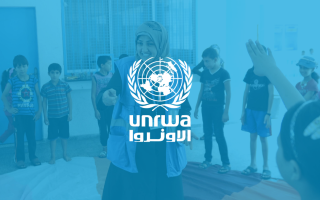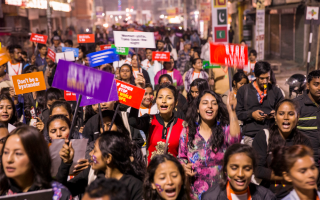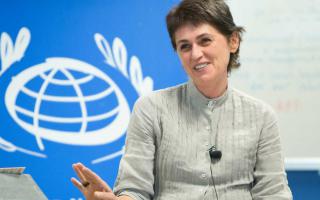UN Country Team Leadership Course: Maximizing Synergies for Greater Impact
Building on the repositioning of the UN development system, the Decade of Action and the imperative for sustainable societal transformation in light of a highly volatile world, this executive five-day programme will strengthen the skills and capabilities required for UN leaders to drive the nationally owned 2030 Agenda for Sustainable Development. The course focuses on the areas of integrated policy support, systems-thinking, strategic communications, and collaborative and adaptive leadership. An exclusive feature of the programme is a site visit, demonstrating the real-life interconnectedness of the 5Ps—people, planet, prosperity, partnership, and peace. In addition, UN leaders will receive a high impact professional and personalized media training as part of the course.
We are all called to lead, to act, to change. The 2030 Agenda for Sustainable Development represents an imperative for transformation for the world. Various crises over the last months and years have underlined the relevance of integrated approaches, as well as the need to develop future-proof solutions. With the COVID-19 pandemic, it became evident that responses need to consider wider economic, social and environmental drivers and feedback loops, as well as the different ways in which diverse groups are affected. Beyond the pandemic, the world is facing a food and energy crisis, again underlining the ripple effects of geopolitical developments in one part of the earth on the globe overall.
Beyond immediate concerns, in the countries and regions we are grappling with, we operate in the context of wider megatrends and a triple planetary crisis of climate emergency, biodiversity loss and pollution that risks reversing any socio-economic gains that have been achieved across the globe in past decades and will affect the possibility of future generations to satisfy their needs.
In this context, the UN needs leaders who are ready to embrace transformation and to fundamentally reconsider the way they think and act. The UN needs leaders who are willing to unlearn, as they redefine the best contribution they can make as individuals, UN entity representatives and members of UN country teams.
The course aims at supporting UN leaders at this critical juncture to articulate, facilitate and broker the needed changes in support of the people in the countries they serve. It also provides a space to discuss the necessary adjustments in the structure, leadership, accountability mechanisms, interaction and capacities of the UN development system which are required to ensure that the collectivity of UN entities are positioned to provide countries with the support they need.
Participants will deepen their knowledge and sharpen their political acumen through engaging discussions with UN senior officials and subject-matter experts. There will be opportunities to share practices through interactive peer-to-peer learning and workshops that unpack inter-agency concerns as well as individual agency contexts and develop solutions that leverage each UN agency’s strengths and expertise.
Experiential learning methods such as a site visit, as well as a full day media training will complement the intense training programme.
Upon successful completion of this course, participants will:
- Have strengthened their knowledge of the vision and principles underlying the 2030 Agenda as well as approaches for its implementation;
- Have gained a deeper understanding of the repositioning process of the UN development system and the implications for UN agencies and Resident Coordinator offices at the country level;
- Have gained a deeper understanding of integrated approaches to sustainable development and systems thinking;
- Have improved their understanding of the defining characteristics of UN leadership and the related ways of working;
- Have acquired knowledge of mechanisms and tools that enhance UNCTs' integrated policy support to countries;
- Be ready to apply the art of effective and strategic communication to improve the quality of dialogue with partners and stakeholders, increase advocacy and highlight results.
This face-to-face course combines inputs and lectures by subject matter experts and senior UN staff with opportunities for knowledge sharing and participatory exercises.
Participants apply their learning through experiential learning methodologies such as case studies, an engaging site visit, team discussions, participatory and innovative learning methods and dialogues with speakers.
Sustainable development vision and principles; challenges and opportunities of repositioning the UN development system; sustainable transformation and systems thinking in the context of Building Back Better; improving political acumen and leadership skills; strengthening strategic communication and advocacy skills.
UN Resident Coordinators (RC) and RC candidates, Country Directors and representatives of UN agencies, funds, and programmes
The course fee of $5,500 covers the following:
- Five days of training, including coffee breaks, as well as an evening reception
- A full day of professional media training to foster competencies to handle various kinds of interviews and press conferences effectively.
- Exclusive access to UNSSC's online social learning environment with training and supporting background materials, and the opportunity to stay connected with colleagues.
- All course materials, resources and contacts.
Participants are expected to cover all travel and lodging costs related to their attendance in the course.





